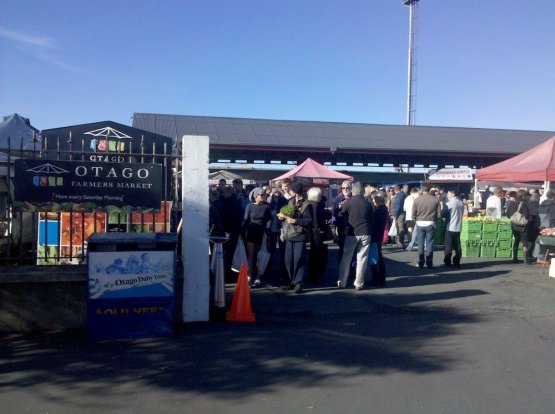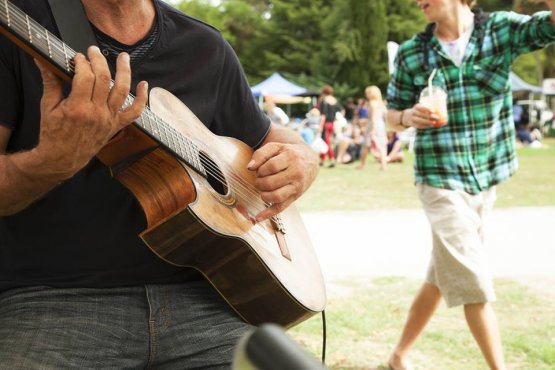When I was in London, I used to go to the Borough Market every weekend; I went there to find a more familiar atmosphere than the one I would normally experience in the metropolis, a place in which I could recognise expressions, colours and emotions which otherwise would seem to have disappeared in everyday life. I could see these through food and wine. I then even began to work there, visiting Broadway Market, Sloane Square Market e Barnes Market too, every other day: different areas of town, different groups of people, different products and different producers.

The entrance to Otago’s market, where every week around a hundred producers bring the fruit of their work
What I noticed is that the interest was ever growing, it wasn’t just a question of numbers but also a matter of what I heard people saying, their comments regarding products, quality and prices. The interest in food, which food celebrities had already created a few years ago, stopped being a past-time for few fortunate people with money and time to spend, and became more accessible. The enthusiasm spread and it seems that it has led people to look at things differently, paying attention to those who produce, transform and do something for the others.
We’ve often heard chefs who speak about territorial cuisine, who declare the names of their suppliers, who are committed in charity activities or, as in the case of
James Oliver in the UK, who use their skills to change the way in which people perceive food and the relationship with their diet. Even Down Under one can breathe a new atmosphere and groups are being formed, promoting, supporting and sharing food. The fact that farmers’ markets are now something consolidated rather than a trend is also because there are many events created on the market day, connected with the market or their protagonists: besides the farmers, one can find small wine producers, craft brewers, cheese producers and also minivans selling espresso, cooking vegan food or pizza, or selling fresh egg pasta or fish that was caught the previous night and transported in large polystyrene boxes with ice.

Hawke's Bay’s market gives space to the region’s buskers, who have the task of entertaining visitors
On South Island, in Dunedin, the
Otago Farmers’ Market on Saturdays is relatively small when compared to the city’s dimension; in North Island, instead, there’s a double market in
Hawke’s Bay, which is held on Saturdays in Napier and on Sundays in Hastings. The latter is hosted in a green space with deckchairs and umbrellas and music, where you can drink matcha tea while sitting on mats, leaving with plenty of fruit and vegetables for the week.
The percentages of those who choose to experience food in a way that is less adherent to classic trade vary every year but consistently. It’s not just a question of selling or buying in places that are different from supermarkets, but, for instance, it’s also about trying to cultivate something on your own, sharing information on methods, creating public gardens, getting the schools involved or creating charity groups.
1. to be continued